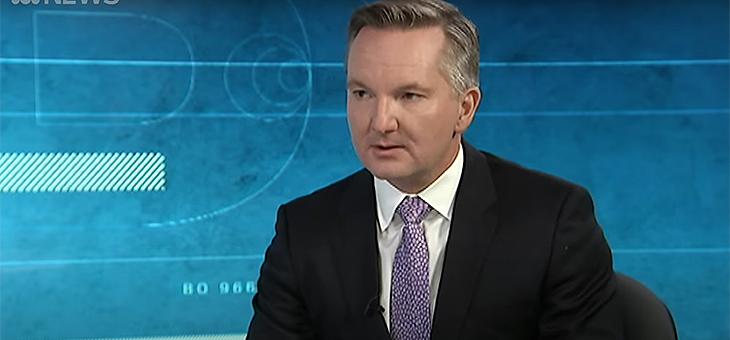Outspoken shadow health minister Chris Bowen wants to tweak Medicare to ensure doctors are paid to stay in touch with chronically ill patients. However, general practitioners say a funds injection would yield billions of dollars of benefits.
Mr Bowen believes the health system can be improved without big spending increases, an about-face from the expenditure promised before Labor’s failed election campaign in 2019.
“Big spending in big-spending portfolios (led to) a lot of the tax measures we had to do last time,” he said.
He believes those tax measures were unpopular and gave the Liberal party electoral leverage.
Mr Bowen told The Australian a Labor government would ‘refresh’ Medicare to reward doctors who ensure chronically ill patients “get the care they need”.
“Nothing has been done to systematically change Medicare to bring it up to speed with the technological abilities that we have now, that were unthinkable in 1984,” he said.
“For most people, your GP is still remunerated episodically, so you go to the doctor and the doctor is remunerated for seeing you.
“But for many members of the community, they need something else. When they see their doctor, they need a doctor to sit down for a long consultation and a good chat about their health.
“And for the doctor then to coordinate other healthcare professionals to help that person back. Whether it is an exercise physiologist, a dietitian, a physiotherapist, a psychologist.
“That will take a lot of work from a doctor. And with a few exceptions of pilot programs, Medicare doesn’t really cater for that properly.”
Mr Bowen said doctors should be paid properly for moving patients to health plans if they pick up more serious ailments when presenting for simpler conditions. He also wants them paid for contacting patients to make sure they are following their health plans.
“A patient turns up, she is 50, morbidly obese, clearly diabetic or pre-diabetic, exhibiting signs of depression,” he said. “When she has cut herself, I (a doctor) shouldn’t just fix up her cut, I should really be spending whatever time it takes to get her on a healthcare plan, getting her a senior dietitian, getting her a senior psychologist, setting up a plan where allied healthcare professionals can report back to me on progress. All that is going to take time, which Medicare is not going to pay. So, we really need to move to a system, in my view, that reflects that.”
The Royal Australian College of General Practitioners (RACGP) commissioned an economic report from PwC Australia looking at what benefits a relatively modest addition of $1 billion funding for primary care would offer Australia.
The report found that re-allocation of funds “would likely result in a much greater suite of combined benefits than any resulting loss to reduced expenditure on hospitals”.
PwC Australia predicted benefits of $1 billion in 2021, at least $5.6 billion over the next five years and potential benefits of up to $24.8 billion over five years.
It was estimated that the extra expenditure would provide a gain of 520,000 quality adjusted life years due to earlier and better access to healthcare.
Nine reported that benefits outlined in the report included “$773 million saved from preventable hospital admission, readmission or emergency department presentations and $250 million in savings from workforce productivity”.
The West is reporting that Australians have used free Medicare services extensively during the COVID-19 pandemic, “pushing bulk billing to a record high”. In the 12 months to September, the bulk billing rate for GP services was 88.7 per cent, 2.6 per cent higher than a year earlier.
“Almost nine out of 10 visits to the doctor nationwide were provided at no cost to the patient.
“Temporary changes to Medicare during the pandemic, such as GP telehealth services to prevent the spend of the virus, were a factor behind the surge in bulk billing.”
Conversely, Nine reports that many people delayed seeing their GP for cancer screening and chronic health condition checks.
RACGP president Dr Karen Price says Australians need to catch up on these procedures or 2021 will be “the year of gaps”.
“There will certainly be people who have delayed presentations of things that they probably shouldn’t delay,” she said.
“I think you’ll find we’ve missed a lot, and we’ll be catching up a lot.”
Dr Price says breast cancer screening numbers have dropped and she expects similar reductions for other cancers, while regular check-ups and preventative care have also reduced.
“Monitoring people’s kidney disease, monitoring their blood pressure, monitoring their cardiovascular risks, and checking in with those sorts of things are also likely to be revealed in the next 12 months,” she said.
Dr Price said general practitioners need more funding to deal with the COVID-19 lag and to prevent unnecessary hospitalisations.
“Progressively there’s been a defunding of Medicare, and Medicare primarily funds general practice,” she said.
“That’s been a concern because that means that patients are losing their ability to purchase general practice services.”
Does Medicare need a refresh? Should Australia spend more on Medicare? What aspects of Medicare frustrate you?
If you enjoy our content, don’t keep it to yourself. Share our free eNews with your friends and encourage them to sign up.
Related articles:
https://www.yourlifechoices.com.au/health/health-insurance-in-death-spiral
https://www.yourlifechoices.com.au/government/medicare/pay-your-gp-what-you-want
https://www.yourlifechoices.com.au/health/health-essentials/better-life-for-those-with-chronic-pain

